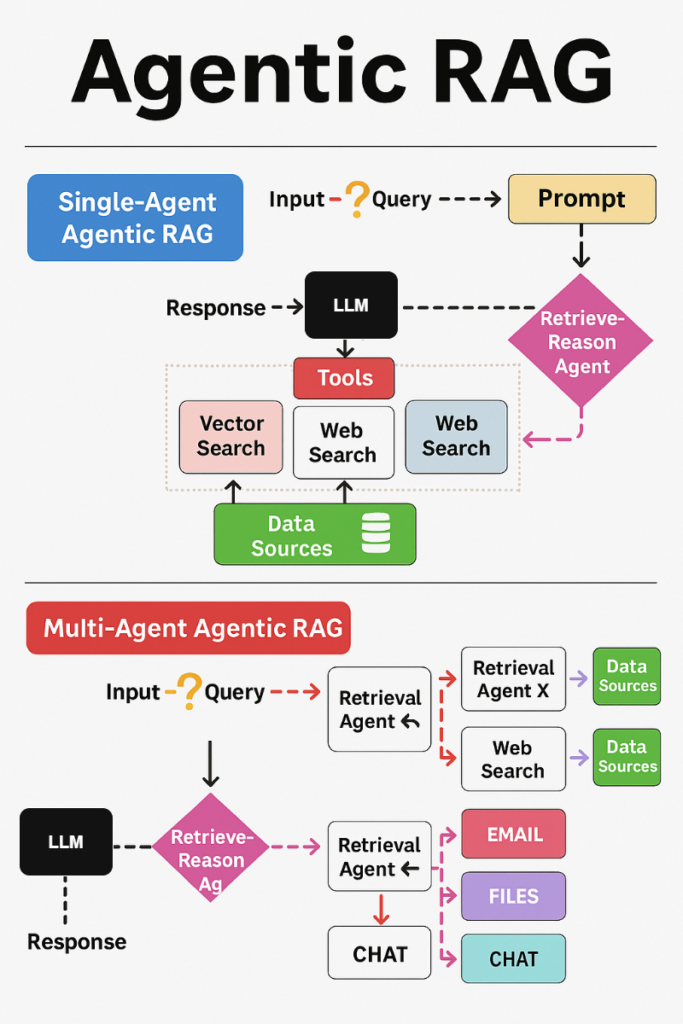Introduction
In the rapidly evolving field of Generative AI, the ability to retrieve relevant and accurate information efficiently has become a cornerstone for building intelligent applications. Retrieval-Augmented Generation (RAG) enhances AI models by integrating external knowledge retrieval, improving their accuracy and reducing hallucinations. Agentic RAG takes this concept a step further by introducing autonomous retrieval agents to refine and optimize the retrieval process. In this article, we will explore the architecture and advantages of Agentic RAG, focusing on both single-agent and multi-agent paradigms.
What is Agentic Retrieval-Augmented Generation?
Agentic Retrieval-Augmented Generation (RAG) builds upon traditional RAG by incorporating intelligent agents that autonomously decide how and where to retrieve relevant data before feeding it into the AI model for generation. These agents leverage multiple retrieval tools, such as vector searches, web searches, and databases, ensuring high-quality context-aware responses. More about RAG please click here!
The two main types of Agentic RAG implementations are:
- Single-Agent Retrieval-Augmented Generation
- Multi-Agent Agentic Retrieval-Augmented Generation
Single-Agent Agentic RAG
In a Single-Agent Agentic RAG, a single retrieval agent handles the query. The process follows these steps:
- A user inputs a query.
- The system generates a prompt.
- The retrieval router agent processes the query and decides on the best retrieval method.
- The agent fetches data from various sources, including vector databases and web searches.
- The retrieved information is then used to generate an intelligent response.
This approach is effective for scenarios where a single, well-optimized retrieval mechanism is sufficient to provide precise answers.
Multi-Agent Agentic RAG
Multi-Agent Agentic RAG introduces multiple retrieval agents, each specializing in a different retrieval method or data source. The workflow involves:
- The user submits a query.
- A retrieval router agent processes the query and delegates retrieval tasks to multiple specialized agents.
- These agents fetch data from a variety of sources, such as vector search engines, web searches, emails, chat logs, and other structured/unstructured data repositories.
- The retrieved data is aggregated, refined, and fed into the AI model for response generation.
This architecture is particularly beneficial when dealing with complex queries that require multi-source validation and broader context awareness.
Advantages of Agentic RAG
- Improved Accuracy: By leveraging multiple retrieval agents, the system ensures more accurate and relevant results.
- Scalability: Multi-agent architectures can scale efficiently to handle large-scale data retrieval.
- Better Adaptability: Different agents can specialize in retrieving data from structured, semi-structured, or unstructured sources.
- Reduced Hallucinations: By grounding responses in real-time retrieved data, the system mitigates AI hallucinations.
- Autonomous Decision-Making: Agentic RAG intelligently selects the best retrieval strategy based on query context.
Real-World Applications
- Enterprise Knowledge Management: Organizations can use Agentic RAG to enhance internal knowledge retrieval from documents, emails, and databases.
- Healthcare and Research: Medical AI can fetch relevant clinical studies, patient records, and research papers to support diagnoses.
- Customer Support and Chatbots: AI-powered chatbots can pull accurate information from multiple sources to provide better customer service.
- Legal and Compliance: AI legal assistants can fetch regulations, case laws, and documentation to assist legal professionals.
Conclusion
Agentic Retrieval-Augmented Generation represents the next evolution in AI-driven knowledge retrieval, making AI applications smarter, more autonomous, and significantly more reliable. Whether using a single-agent model for streamlined retrieval or even a multi-agent system for complex queries, Agentic RAG not only empowers AI but also enables it to provide more precise and contextually relevant responses.
At ByteCraft Labs, we are at the forefront of developing cutting-edge AI solutions, including Agentic Retrieval-Augmented Generation implementations. If you’re interested in leveraging Agentic RAG for your business, reach out to us and explore the possibilities of next-gen AI-driven information retrieval!
#AgenticAI #AIAgents #MultiAgentSystems #ConversationalAI #AutonomousAgents#ByteCraftLabs #TechInnovation #FutureOfAI #DeepLearning #AITransformation
